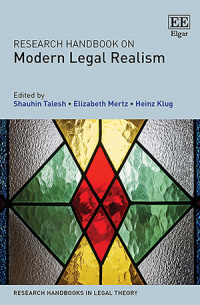Emily Taylor Poppe’s chapter, New Legal Realism Goes to Law School in the Research Handbook on Modern Legal Realism (Talesh, Klug, and Mertz, eds. 2020), has been identified by Scott Cummings as ‘one of the best works of recent scholarship relating to the Legal Profession’. Cummings states that the chapter ‘succeeds in making a targeted intervention that provides useful insights into how law school might change to advance NLR goals.’
To read the full review of Taylor Poppe’s chapter, go to: Jotwell: The Journal of Things We Like (Lots)
The abstract for the chapter is included below.
Legal Realism was both a stunning success and a dismal failure; while it pierced the veil of legal formalism, it failed in its attempt to integrate law and social science. New Legal Realism seeks to address the failings of Legal Realism, by directing greater attention to the challenges of incorporating social scientific insights into legal discourse. In this chapter, I argue that to accomplish the integration of social science and law, legal education must be reoriented to further the goals of New Legal Realism. In particular, I consider how the formal curriculum, hidden curriculum, and law school pedagogy might be reformed to provide skills, knowledge, and values that are consistent with New Legal Realism’s emphasis on empiricism, interdisciplinarity, and social contextualization. Using civil procedure as an example, I illustrate what a New Legal Realist approach to legal education might look like. Acknowledging the institutional and ideological barriers to this approach, I argue that the present moment offers a unique opportunity for New Legal Realism to succeed.

